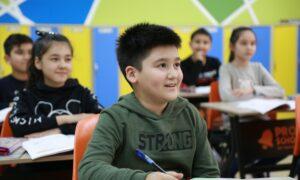Survey findings by the National Center for Education Statistics show that attention spans and disciplinary issues remain a problem in schools nationwide.
Lack of focus and attention among K–12 students remains a serious problem in public schools long after the onset of the COVID-19 pandemic and the return to in-person learning, according to the U.S. Department of Education.
The report, based on a May 2024 survey of 116 districts across all regions of the United States, also said 83 percent of school districts believe that the lingering effects of the pandemic continue to hurt the “socioemotional development of students.”
Moreover, a July 18 statement from NCES based on the same research noted that 26 percent of school leaders or educators surveyed reported that their students’ lack of focus had a severe negative effect on education despite high-dose tutoring efforts aimed at helping them make up for lost learning during the pandemic.
It also said that 45 percent of schools confiscated weapons during the past school year, 57 percent removed tobacco, alcohol, or drugs from students on school property, and 30 percent reported incidents of cyberbullying each week.
“Schools continue to grapple with the ongoing impact the pandemic had on their students,” NCES Commissioner Peggy Carr said in the statement.
Jennifer Glenn, president of the Ohio School Psychologists Association, said the reported issues with student performance and behavior are symptoms of a more significant problem in this era of post-pandemic learning, “but not the problem itself.”
She said teachers have less time to create engaging lessons for the entire class or individuals because learning recovery and improved standardized test results remain the priority.
There’s also a severe national shortage of school psychologists, so schools often lack trained professionals to develop an understanding of why some children are so distracted.
The abundance of screen time, which became a staple for millions of children before and during the pandemic, also is contributing to the problem, Glenn said.
“The quick pace [of social media and video games] reinforces and rewrites the brain’s rewards center,” she said. “When they sit through a teacher’s lesson, there’s a lot less reinforcement.”
For low-income students who were especially traumatized by the pandemic, school psychologists have found that “fight-or-flight” instincts are still active for children who worry about food or other problems with their home lives.
“That response elevates more pressing issues,” Glenn said. “They are not focused on what the teacher is trying to instruct. The content is not relevant to them.”
Glenn said there are many free or low-cost solutions to help school districts reverse the negative trend. For example, bringing back recess and free time could improve focus. Ohio is among many states where recess during the school day is not mandated.
A short afternoon break during which students can socialize with their peers, play freely, and get some exercise improves attention and focus for the second half of the day, she said.
Glenn said more collaborative and student-led lessons could also work. Teachers need more time to plan engaging classroom activities and fewer paperwork requirements.
She also advocates brief “mindfulness” lessons during which students can explore ways to improve their concentration. Many such materials are available for free online.
The National Association of School Psychologists (NASP) promotes a standard of one psychologist per 500 students.
According to NASP data for 2023, the latest year available, Connecticut and Utah were the only two states that met that ratio. Alabama was listed as having the worst ratio, at 250,308 students per school psychologist.
Glenn said her organization and the NASP advocate for additional and improved mental wellness services for public schools.
Many K–12 districts contract for school psychology services at a minimum level because they can’t afford to add staff.
This will be a hot topic for years to come, Glenn said, as educators are also dealing with declining social skills and increased classroom disruptions.
“The research is just beginning.”
Original News Source Link – Epoch Times
Running For Office? Conservative Campaign Consulting – Election Day Strategies!


